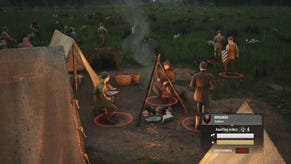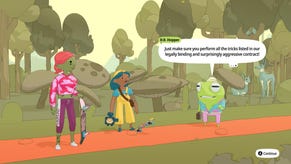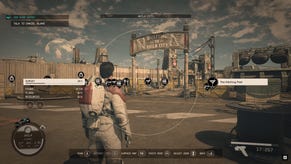Dark Futures Part 2: Emil Pagliarulo
Emil Pagliarulo started his career this side of the fence, writing for the venerable Adrenaline Vault. Since kicking his way into development, he worked in the twilight years of Looking Glass - where he was designer on the eternal Life Of The Party - before moving to work on Bethesda, where he was Designer on Oblivion (Think "Dark Brotherhood") before becoming Lead Designer on Fallout 3. He's optimistic about the future, will surprise you by how big an influence Deus Ex was on Fallout 3 and has enormous sympathy for Eidos Montreal...
RPS: It's been ten years since Deus Ex. Looking back, what do you think? Was that a milestone or a gravestone?
Emil Pagliarulo: It's funny. Deus Ex came out and I played it when I was at Looking Glass and it was before I had a chance to meet Harvey Smith for the first time. I got to talk to him about his game, and it was very cool. I didn't know what it was or what to expect, and it was definitely by far my game of the year. I thought it was amazing. And here we are 10 years, and for me personally, no other game had as much influence on Fallout 3 than Deus Ex did. By far. I mean, huge inspiration to the point where I knew I was replicating... I mean, I knew I was stealing from it wholesale at some points, you know what I mean? And happy to do so.
RPS: Looking at the late 00s, the two games most obviously in Deus Ex's shadow are Bioshock and Fallout 3... which shows the breadth which this sort of covers. One of the themes I saw in the 00s was trying to work out a way to make games like this actually sell. Would that be one you'd agree with?
Emil Pagliarulo: I would. Certainly the types of games I was into. And for me, they represent the soul of Looking Glass Studios. What that means to me is these immersive first-person games which try to do more than just offer an RPG experience or do more than just offering an FPS experience. Again it's that illusive buzzword “emergent”... which does mean something to some people, and is something to strive for. It's a genre-busting sort of thing where you want to wrap the player in an experience – and first person is generally the best way to do that. To me, that's what that represents.
RPS: What's so powerful about the first person?
Emil Pagliarulo: It's the feeling of do I control that avatar on screen, or am I that avatar? And for me, the first-person is always about being that avatar. And it comes with its own unique set of challenges. When you're that close to an environment the simple act of pulling a camera in closely means you have to look at your visual fidelity, because it's going to have to be so much better. Play a great 3rd person game... and if it gives you the ability to zoom in the camera, do that and then look at the environment and see if it looks as good zoomed in as it does zoomed out. Pretty much 9/10 times the answer will be no. But when you're making a first-person game with the camera zoomed in and everything in your face you're trying for the level of visual fidelity which convinces you that you're in this world. And for me, that's what it's all about. It's like... you don't need all these 3D glasses for virtual reality! Virtual Reality is that sense of being involved in a world, and first-person is what does that for me.
RPS: It's interesting that you say Deus Ex was such an influence, as it's not one which I've ever noticed turn up in reviews or comment threads so much. Or is that just RPS?
Emil Pagliarulo: For Fallout 3 specifically, it's probably because if I say the games are the soul of Looking Glass... well, it's also the soul of early Bethesda games. Early Bethesda games – much like the games we make today – are very immersive first-person things. Terminator Future Shock! The Early Elder Scroll games like Arena or Daggerfall. So when most people look at Fallout 3, they look at the legacy of this studio and don't look beyond it... and if they did, they'd find a lot of Deus Ex in Fallout 3.
RPS: Thinking about it, Deus Ex was more in the Bethesda model of open spaces with people in it. The closest an actual Looking Glass game came to that was Ultima Underworld... but by definition UNDERWORLD. Shock killed all its supporting cast. Thief was intense and non-communicative. So – what's the problem in the larger scale sort of game? Why don't we see them?
Emil Pagliarulo: A reason you haven't seen a lot of those games recently is because there's the big concentration on console gaming, and the boom of the console markets... well, games like that are very hard to do on the console. A game like Oblivion or Fallout 3 on the console is difficult. It's only because we have experience in doing it that we can conceive of doing it. When you're making a game on the PC, your Hard-drive is however many gigs. Everyone has 80Gb at least! Those aren't luxuries you have on the console. For Oblivion, we came close to running out of space on the disc for just the audio. So when you want to have that many people to talk to, with this giant open world with all these people there are technical limitations which present themselves which other studios have tried to handle and have had problem with – and for good reason, because it's hard.
RPS: I've just got off the phone from Randy Smith. It's interesting to speak to two guys who are informed by some similar ideas, but working on different ends of the industry.
Emil Pagliarulo: I'm lucky enough to be at one of the only places left which makes games like that. For an Ex-LG guy, I think Irrational or Bethesda are the places you'll want to be to make those kind of games. So it's been great for me to be here and to hold onto that and still do that... but when I look at a game like Spider, it's totally different... but great design is great design and fun is still fun.
RPS: What would you do if Bethesda closed?
Emil Pagliarulo: Oh boy!
RPS: Skip past the crying.
Emil Pagliarulo: All of my kids are in elementary school. And before I joined the games industry, I was going to be an elementary school teacher and I don't think I would ever want to do that again. I think I would still try to do what I'm doing now somewhere else, as close to what I'm doing now as humanly possible. I don't know where that would be. I really can't imagine myself being anywhere else.
RPS: Looking forwards, Bioshock and Fallout 3 have shown there is an audience for this kind of game. What now?
Emil Pagliarulo: I look at other companies and what they're doing, and how they're trying to approach this sort of thing and how they streamline the experience – companies who are good at distilling the essence of open world type games and distilling the greatness out of them. And I look at Red Dead Redemption, which is probably by far one of the best games I've ever played. It could quite possibly be my new favourite game of all time. And I love everything they achieved, and the fact they have been able to distil the essence of what is great in an open world game into its core elements. That's interesting to me. It's very much a console game. It's easy to play. It's easy to pick up. It's got a great story. Great music. It's sort of the unicorn for me.
And I look at that and I wonder how can we get our games more... well, I look at Fallout 3 and think “how could it be more accessible? How could it be maybe a little easier to play?”. Because I think, it's got a lot of old-skool PC Games soul in it, and sort of inherent in that is some inherent kludginess which I'd like to get rid of. So I'm really looking at how to make the same sort of experiences better.
RPS: That strikes me as a logical extension of what people were are doing in the 00s. Trying to work out a way to help people into it. I'm replaying DX at the moment – and I'm amazed at how much better I process. But fuck me, it's a mess.
Emil Pagliarulo: But it runs! That's an accomplishment.
RPS: So – it's just finding a way to open it up to more people?
Emil Pagliarulo: The other thing that's interesting about Deus Ex is the sense of choice. I know there's studios who are big on player choice... but choice and realism are two things which I think when you make immersive sims that you struggle with. Alright! I'm giving the player the ability to make these choices, but are they meaningful? And even if they're meaningful, are they fun? Do I care? And the same thing with realism. Yes, I've made my game more realistic... but is it fun? When you look at any game with a stealth component, like Thief, or the stealth-component in Fallout or Oblivion or Deus Ex... I think you find that designers who are inexperienced in making stealth are always on the side of making it too hard, because it's more realistic. But finding the balance between realism and choice and where those things matter.
Because it's one of the things we struggled with on Fallout. When we first got the licence we heard from a couple of places that RPGs aren't supposed to be fun. They're supposed to be meaningful. And great! I'd love to make a meaningful game, but if I'm making a meaningful game that's not also fun it's time for me to hang up my mouse. That's something I'm always looking at.
RPS: What games in this area in the last 10 years stand out to you. Anything you particularly admire?
Emil Pagliarulo: All the Rockstar games, for sure. Because I love the open-endedness of them, and that Rockstar are constantly evolving themselves. If you look at the difference between GTA3 and 4 in how they wanted.... well, GTA 4 is a lot more mature in a lot of ways. So I admire that. A lot of the open-ended immersive things get pulled off in MMOs , which is interesting. Because they're the ones who try it. They're always PC games, they don't have to worry about memory, so they try these sort of things, so you get a lot of interesting open world stuff there – like Lord of the Rings: Online. I really appreciate what they did in that game. And Vampire Bloodlines has some of the most memorable characters I've ever encountered.
RPS: Anything else?
I play so many games that it blends together! It's odd, because as a player I go from stuff like that to things like Modern Warfare or Darksiders. So those certainly aren't the only types of games I appreciate. I'll tell you where I see a lot of experimentation? The European PC games market is a great place to find these type of game. There was a game... you of all people should know it. You know Boiling Point?
RPS: Oh, I know Boiling Point.
Emil Pagliarulo: I love what that game attempted. For people who don't know what it is – well, hunting down cartels in an open-ended jungle. It's really like a contemporary Morrowind in a jungle. So stuff like that. Games that aren't afraid. Developers who aren't afraid to try these grand, crazy things. I think the spirit is alive when I see stuff like that.
RPS: During our round-table, we mentioned that people who were teenagers when Deus Ex came out are starting to come into positions of influence. In 10 more years, they'll be in charge. And they'll start giving orders. It's like the baby boomers coming into power. Now there's a Dark Future for us all.
Emil Pagliarulo: The more games I see like that – the more Deus Exs I see, the better. I'm really hopeful for what Eidos is doing with Human Revolution. I wish them the best. We're in a strange position here. I understand what they're going through. They acquired a licence – in the same way we acquired a licence. Not a lot of people probably had faith in them – in the same way that not a lot of people had faith in us. And at the same time, I know Harvey Smith and the guys who made the original Deus Ex and I understand their point of view. This is something they created and don't want to see it screwed up. So... I think the important thing to remember for people making games like that is that they're doing it because they love the original and they love that type of game, and they love what that represents.
RPS: It's a big job. It is the same as when you guys got Fallout. I just said “Fucking hell - I don't envy them”.
Emil Pagliarulo: [Laughs] Well... you should envy me. It's a good gig, man.
RPS: Thanks for your time.












